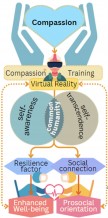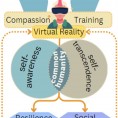
Empowering Emerging Adults through Compassion and Enhanced Social Connection: Co-creating a Compassionate Connection Oasis VR Toolkit (ccOasisVR)
Emerging adulthood (18−25) is a critical developmental phase, a tumultuous transition marked by heightened distress, and, unfortunately, a decreased likelihood that Emerging Adults (EAs) will seek support. The COVID-19 pandemic further exposed the urgent need for innovative, accessible well-being support for this population, underscoring the limited resources available for those experiencing distress without clinical diagnoses. Compassion is key to fostering resilience and genuine social connection, which can lead to enhanced well-being and prosocial outcomes. Compassion training transforms adversity into growth opportunities, and when nurtured during formative years, paves the way for lifelong positive patterns of well-being that ripple into communities. Despite the positive benefits of compassion training, research shows that EAs are resistant to practicing in part due to stigma. Moreover, developing compassion is difficult because it requires practice in meaningful emotionally laden social situations with real-time feedback of internal psychological and physiological states.
To address these challenges, our research goal is to explore how we can support emerging adults (EAs) to cultivate compassion and social connection, which will help us understand how to design effective VR experiences that support well-being. Our goal builds on prior innovative research in virtual reality (VR) including our own, which have shown that VR’s unique affordances of 3D embodied experiences, multi-sensory feedback, and social interaction can foster agency, transformative emotions, and social connectedness. As such, VR has great potential for enhancing EA compassion training by placing EAs in realistic emotionally laden virtual environments that provide real-time multi-sensory feedback where they can practice compassion without stigma.
To achieve our goal, we will take a research-through-design (RtD) approach to co-create a novel VR toolkit, ‘Compassionate Connection Oasis VR Toolkit’ (ccOasisVR) with EAs and community stakeholders as co-designers. Co-creating solutions will yield both a practical toolkit and deeper psychological insights into EA experiences, needs, and barriers to self-compassion and social support. Another outcome of our project is a compassion-based VR framework that will contribute to theoretical advancements in understanding the role of embodied learning in VR for self-compassion and social connection.
This innovative work will make important contributions to the fields of social psychology, interaction design, and digital health by working across interdisciplinary divides to combine insights from participatory design and empirical field studies. ccOasisVR has the potential to help undiagnosed EAs experiencing distress gain accessible resources to alleviate suffering. Knowledge mobilization will contribute the design of effective digital compassion tools, which may be deployed in educational settings such as universities and community centers. Research outcomes may be transferable to other user groups including teens, adults, and clinical populations.
Overall, this project will bring together creative practices from RtD with community engagement and collaboration and empirical research in mixed methods field studies to explore how we can cultivate EA compassion and social connection through a VR toolkit. Implementing ccOasisVR creates a safe space for practicing compassion and social support, potentially reducing stigma and increasing help-seeking of EAs, ultimately contributing to a more compassionate and connected society.
Related publications and exhibits
Sorry, there’s no items to display.
Related Projects
Awedyssey: VR for promoting and enhancing well-being
SIRIUS — Virtual Earthgazing to mitigate effects of sensory isolation
Virtual Earthgazing — towards an overview effect in Virtual Reality
Support & Acknowledgement
This project is supported by a SSHRC Insight Grant
